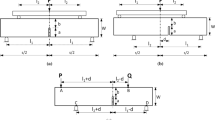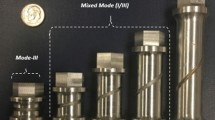Abstract
In many engineering applications, Mode-III type loading in the crack tip region is more common. Since loading in structures oftentimes is quite complex, the crack tip region generally experiences Mixed-Mode conditions. In this work, torsional loading experiments are performed by employing a modified spirally cracked cylindrical specimen. The cylindrical specimen used in all experiments is machined to incorporate a full revolution, spiral v-notch crack. The v-notch crack is inclined at an angle of 67.5° with respect to the specimen centerline to obtain Mixed-Mode (I/III) crack tip conditions under torsional loading. By combining the experimental measurements with detailed numerical simulations, the Mixed-Mode (I/III) fracture parameters for polycarbonate (PC) are quantified using an interaction integral method. The elastic-viscoplastic material response of the PC material, required for numerical simulations, is determined by performing standard tensile loading experiments. The Mixed-Mode (I/III) fracture toughness, as well as the stress intensity factors for Mode-I and Mode-III crack tip conditions are presented and discussed.
Access this chapter
Tax calculation will be finalised at checkout
Purchases are for personal use only
Similar content being viewed by others
References
Faye, A., Basu, S., Parameswaran, V.: Effect of loading rate on dynamic fracture toghness of polycarbonate. Dyn. Behav. Mater., 139–145 (2014)
Cho, K., Yang, J.H., Kang, B.I., Park, C.E.: Notch sensitivity of polycarbonate and toughened polycarbonate. J. Appl. Polym. Sci. 89, 3115–3121 (2003). https://doi.org/10.1002/app.12502
Gearing, B.P., Anand, L.: Notch-sensitive fracture of polycarbonate. Int. J. Solids Struct. 41, 827–845 (2004). https://doi.org/10.1016/j.ijsolstr.2003.09.058
Salazar, A., Rodríguez, J., Martinez, A.B.: Fracture toughness reliability in polycarbonate: notch sharpening effects. Indian J. Mater. Sci. 2013, 1–4 (2013). https://doi.org/10.1155/2013/187802
LD, G.: Crazing, yielding, and fracture of polymers. I. Ductile brittle transition in polycarbonate. J. Appl. Polym. Sci. 13, 2129–2147 (2018)
Parvin, M., Williams, J.G.: Ductile-brittle fracture transitions in polycarbonate. Int. J. Fract. 11, 963–972 (1975). https://doi.org/10.1007/BF00033842
Sundaram, B.M., Tippur, H.V.: Dynamic mixed-mode fracture behaviors of PMMA and polycarbonate. Eng. Fract. Mech. 176, 186–212 (2017)
Ravi-Chandar, K.: On the failure mode transitions in polycarbonate under dynamic mixed-mode loading. Int. J. Solids Struct. 32, 925–938 (1995)
Ishikawa, M., Noarisawa, I., Ogawa, H.: Criterion for craze nucleation in polycarbonate. J. Polym. Sci. Polym. Phys. Ed. 15, 1791–1804 (1977)
Liu, S., Chao, Y.J., Zhu, X.: Tensile-shear transition in mixed mode I/III fracture. Int. J. Solids Struct. 41, 6147–6172 (2004)
Boyce, M.C.: Large Inelastic Deformation of Glassy Polymers. PhD thesis, Massachusetts Institute of Technology (1986)
Kidane, A., Wang, J.: A new method for dynamic fracture toughness determination using torsion Hopkinson pressure bar. In: Dynamic Behavior of Materials, Conference Proceedings of the Society for Experimental Mechanics, pp. 307–312, New York (2013)
Wang, J.-A., Liu, K.C.: Fracture Toughness Determination Using Spiral-Grooved Cylindrical Specimen and Pure Torsional Loading, p. 2 (2003)
Fahem, A., Kidane, A.: Modification of Benthem solution for mode I fracture of cylinder with spiral crack subjected to torsion. Fract. Fatigue Fail. Damage Evol. Proc. Soc. Exp. Mech. Ser. 6, 57–63 (2019). https://doi.org/10.1007/978-3-319-95879-8_10
Fahem, A., Kidane, A.: A progression on the determination of dynamic fracture initiation toughness using spiral crack. Fract. Fatigue Fail. Damage Evol. Conf. Proc. Soc. Exp. Mech. Ser. 6, 89–95 (2019). https://doi.org/10.1007/978-3-319-95879-8_15
ASTM: Designation: ASTM D638-14 standard test method for tensile properties of plastics. ASTM Int. (2015). https://doi.org/10.1520/D0638-14
Sutton, M.A., Orteu, J.J., Schreier, H.W.: Image Correlation for Shape, Motion and Deformation Measurements- Basic Concepts, Theory and Applications. Image Rochester NY 341 (2009)
Sutton, M.A., Deng, X., Liu, J., Yang, L.: Determination of elastic-plastic stresses and strains from measured surface strain data. Exp. Mech., 99–112 (1996)
Fahem, A., Kidane, A.: Hybrid computational and experimental approach to identify the dynamic initiation fracture toughness at high loading rate. Dyn. Behav. Mater. Conf. Proc. Soc. Exp. Mech. 1, 141–146 (2018). https://doi.org/10.1007/978-3-319-62956-8_24
Fahem, A., Kidane, A.: A general approach to evaluate the dynamic fracture toughness of materials. Dyn. Behav. Mater. Conf. Proc. Soc. Exp. Appl. Mech. 1, 185–194 (2017). https://doi.org/10.1007/978-3-319-41132-3_26
Fahem, A., Kidane, A., Sutton, M.: Mode-I dynamic fracture initiation toughness using torsion load. Eng. Fract. Mech. 213, 53–71 (2019). https://doi.org/10.1016/j.engfracmech.2019.03.039
Fahem, A.F., Kidane, A., Sutton, M.: A model for calculating geometry factors for mode I stress intensity factor of a cylindrical specimen with spiral crack subjected to torsion. Eng. Fract. Mech. under review (2019)
Beer, F.P., Johnston, E.R., DeWolf, J.T.: Mechanics of Materials. McGraw-Hill, Boston (2006)
Acknowledgments
The support provided by the Ministry of Higher Education and Scientific Research, University of Al-Qadisiyah, College of Engineering, Mechanical Engineering Department, Iraq is greatly acknowledged. The support of the Department of Mechanical Engineering at the University of South Carolina and the Center for Mechanics, Materials, and NDE in the development and maintenance of the dynamic experimental equipment is deeply appreciated. The support of Dr. Jordan at the Air Force Office of Scientific Research and the Department of Defense DURIP program is gratefully appreciated.
Author information
Authors and Affiliations
Corresponding author
Editor information
Editors and Affiliations
Rights and permissions
Copyright information
© 2021 The Society for Experimental Mechanics, Inc.
About this paper
Cite this paper
Fahem, A.F., Gupta, V., Kidane, A., Sutton, M.A. (2021). Determination of Mixed-Mode (I/III) Fracture of Polycarbonate. In: Xia, S., Beese, A., Berke, R.B. (eds) Fracture, Fatigue, Failure and Damage Evolution , Volume 3. Conference Proceedings of the Society for Experimental Mechanics Series. Springer, Cham. https://doi.org/10.1007/978-3-030-60959-7_13
Download citation
DOI: https://doi.org/10.1007/978-3-030-60959-7_13
Published:
Publisher Name: Springer, Cham
Print ISBN: 978-3-030-60958-0
Online ISBN: 978-3-030-60959-7
eBook Packages: EngineeringEngineering (R0)




